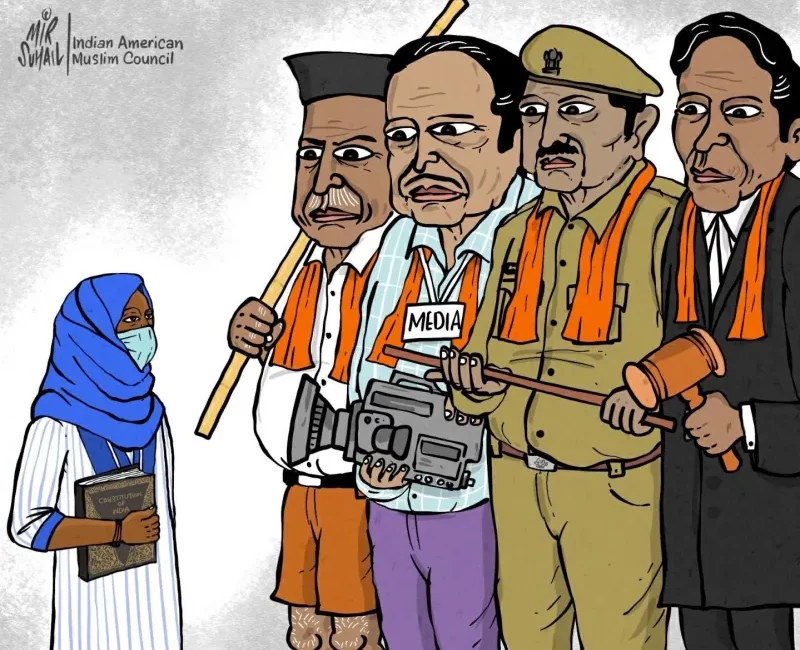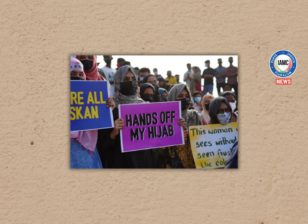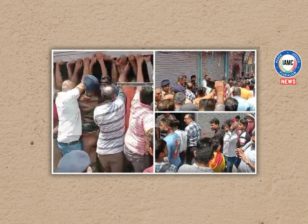The Daily Herald Guest Opinion:The hijab and India’s slide away from open democracy
In the United states, wearing a hijab, or head cover, is, with rare exceptions, a non-issue. One can stand in the lobby of my hospital or at a quad of any educational institution and within a short span of time, see folks of different attire or religious symbols walk by.
It adds to the diversity of the society. The U.S. is like a garden where flowers of many different colors blossom. Diversity is the hallmark of a liberal democratic society with emphasis on liberal.
India used to be like us. But in the last few years with the rise to power of the right-wing Hindu administration, its liberalism has gone into serious recession. Examples are many. The latest is banning Muslim girls in schools and colleges their right to wear the hijab.
The issue became viral after a video surfaced on social media. A young girl wearing the hijab, rides into the parking lot of her college on her scooter, parks the vehicle and starts walking towards the entrance. She is immediately accosted by a gaggle of young men with saffron-colored shawls (saffron is the preferred color of the right-wing Hindu groups) draped over their shoulders, who start shouting their favorite slogan, Jai Sri Ram (Praise Lord Ram.) She stands her ground, raises her fist in the air in defiance, and shouts back, “God is great.”
Muskan, the girl in the video, is a 19-year-old student at the college in the second year of her courses for a bachelor of commerce degree.
“I was returning an assignment” she said.
For the past few weeks in a southern state of India, Karnataka and now other states, girls in multiple colleges and schools are being prevented from entering institutions, attending classes or taking term exams, unless they take off the hijab.
The main reason offered by the schools for banning hijab is that it vitiates the secular ambience of an institution. These young Muslim women sought relief from the courts. The Karnataka High Court upheld the hijab ban, citing the need for uniformity of dress in teaching institutions, agreeing with schools that the hijab is a religious symbol. The institutions were not banning any other religious symbol like the Bindi that is worn by Hindu girls on their forehead. Another argument offered by the courts is that the Quran does not prescribe hijab, therefore it is not an essential religious symbol.
For the state to claim it can determine what a faith prescribes for its followers sets a dangerous precedent. The state should not be in the business of interpreting a scripture. It is for the individuals of the faith to decide it for themselves. It is the duty of the state to protect the rights of its citizens to practice their faith as they deem fit, as long it does not cause harm to the society.
The most hypocritical is the disturbance of law-and-order argument. The girls started protesting when they were banned. There were emotional pleas with the school administrators. The students are the victims, not the instigators. To presume that they ae being forced to wear the hijab/Niqab is not accurate, either. There is diversity of opinion in wearing hijab among Muslim women. There is no faith where its followers do not have varying opinions about how to practice it. There are many instances where one family member, like a mother, may wear the hijab and another, like a daughter, may not or the other way around.
These Muslim girls have been attending schools and colleges in hijab forever, so why the ban now. An obvious explanation is that the state of Karnataka is currently ruled by the right-wing Hindu nationalist party, the BJP, that has the aspiration of making India a Hindu nation. In BJP’s India, only a saffron flower may bloom. Banning hijab is the latest in their desire to make Muslims the “other.”
With the BJP in power, the anti-Muslim rhetoric has increased, hate crimes against Muslims and Christians and Dalits have skyrocketed. Muslims have been lynched for trading or even for the suspicion of trading in cows, and Muslim men have been pulled out of trains for traveling with a Hindu woman. Christian priests have been assaulted for the canard of conversion when they were offering prayers.
Even on Christmas, right-wing Hindu goons attacked church services and vandalized church properties. Atrocities against Dalits (euphemism for untouchables) have continued, including recently, the physical assault of a Dalit groom riding a horse that was considered an insult to the higher caste communities.
All societies have old traditions and histories to grapple with. India is no exception. India started out on positive note. Sadly, it is rapidly becoming an “illiberal” democracy. Democracy without liberalism turns into an oppressive form of majoritarianism.
Javeed Akhter is a physician and freelance writer from Oak Brook.
This article orginally appeared in The Daily Herald




